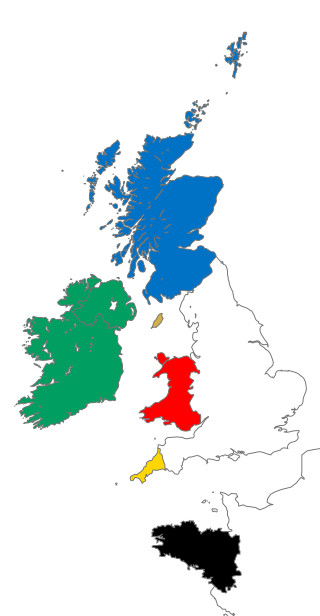
In Celtic cultures, a bard is a professional story teller, verse-maker, music composer, oral historian and genealogist, employed by a patron to commemorate one or more of the patron's ancestors and to praise the patron's own activities.

Sorley MacLean was a Scottish Gaelic poet, described by the Scottish Poetry Library as "one of the major Scottish poets of the modern era" because of his "mastery of his chosen medium and his engagement with the European poetic tradition and European politics". Nobel Prize Laureate Seamus Heaney credited MacLean with saving Scottish Gaelic poetry.

Scottish literature is literature written in Scotland or by Scottish writers. It includes works in English, Scottish Gaelic, Scots, Brythonic, French, Latin, Norn or other languages written within the modern boundaries of Scotland.
British literature is literature from the United Kingdom of Great Britain and Northern Ireland, the Isle of Man, and the Channel Islands. This article covers British literature in the English language. Anglo-Saxon literature is included, and there is some discussion of Latin and Anglo-Norman literature, where literature in these languages relate to the early development of the English language and literature. There is also some brief discussion of major figures who wrote in Scots, but the main discussion is in the various Scottish literature articles.

Irish poetry is poetry written by poets from Ireland, politically the Republic of Ireland and Northern Ireland today. It is mainly written in Irish, though some is in English, Scottish Gaelic and others in Hiberno-Latin. The complex interplay between the two main traditions, and between both of them and other poetries in English and Scottish Gaelic, has produced a body of work that is both rich in variety and difficult to categorise.

Irish literature is literature written in the Irish, Latin, English and Scots languages on the island of Ireland. The earliest recorded Irish writing dates from back in the 7th century and was produced by monks writing in both Latin and Early Irish, including religious texts, poetry and mythological tales. There is a large surviving body of Irish mythological writing, including tales such as The Táin and Mad King Sweeny.

This is a list of articles about poetry in a single language or produced by a single nation.
The New Apocalyptics were a poetry grouping in the United Kingdom in the 1940s, taking their name from the anthology The New Apocalypse (1939), which was edited by J. F. Hendry (1912–1986) and Henry Treece. There followed the further anthologies The White Horseman (1941) and The Crown and Sickle (1944).
Events in the year 1906 in Ireland.

The culture of Scotland refers to the patterns of human activity and symbolism associated with Scotland and the Scottish people. The Scottish flag is blue with a white saltire, and represents the cross of Saint Andrew.
Tom Leonard was a Scottish poet, writer and critic. He was best known for his poems written in Glaswegian dialect, particularly his Six Glasgow Poems and The Six O'Clock News. His work frequently dealt with the relationship between language, class and culture.
Prof Kenneth Hurlstone Jackson CBE FRSE FSA DLitt was an English linguist and a translator who specialised in the Celtic languages. He demonstrated how the text of the Ulster Cycle of tales, written circa AD 1100, preserves an oral tradition originating some six centuries earlier and reflects Celtic Irish society of the third and fourth century AD. His Celtic Miscellany is a popular standard.
The following outline is provided as an overview of and topical guide to the Middle Ages:

The Scottish Poetry Library is a public library specialising in Scottish poetry. Since 1999, the library has been based at 5 Crichton's Close, just off the Canongate in Edinburgh's Old Town.
Scottish Gaelic literature refers to literary works composed in the Scottish Gaelic language, which is, like Irish and Manx, a member of the Goidelic branch of Celtic languages. Gaelic literature was also composed in Gàidhealtachd communities throughout the global Scottish diaspora where the language has been and is still spoken.

That part of the United Kingdom called Northern Ireland was created in 1922, with the partition of the island of Ireland. The majority of the population of Northern Ireland wanted to remain within the United Kingdom. Most of these were the Protestant descendants of colonists from Great Britain.
Nigel James Leask is a Scottish academic publishing on Romantic, Scottish, and Anglo-Indian literature, with special interest on British Empire, Orientalism, and Travel writing. He has been Regius Professor of English language and literature at the University of Glasgow, since 2004.

Scottish literature in the Middle Ages is literature written in Scotland, or by Scottish writers, between the departure of the Romans from Britain in the fifth century, until the establishment of the Renaissance in the late fifteenth century and early sixteenth century. It includes literature written in Brythonic, Scottish Gaelic, Scots, French and Latin.

Poetry of Scotland includes all forms of verse written in Brythonic, Latin, Scottish Gaelic, Scots, French, English and Esperanto and any language in which poetry has been written within the boundaries of modern Scotland, or by Scottish people.

In addition to English, literature has been written in a wide variety of other languages in Britain, that is the United Kingdom, the Isle of Man and the Channel Islands. This includes literature in Scottish Gaelic, Welsh, Latin, Cornish, Anglo-Norman, Guernésiais, Jèrriais, Manx, and Irish. Literature in Anglo-Saxon is treated as English literature and literature in Scots as Scottish literature.











